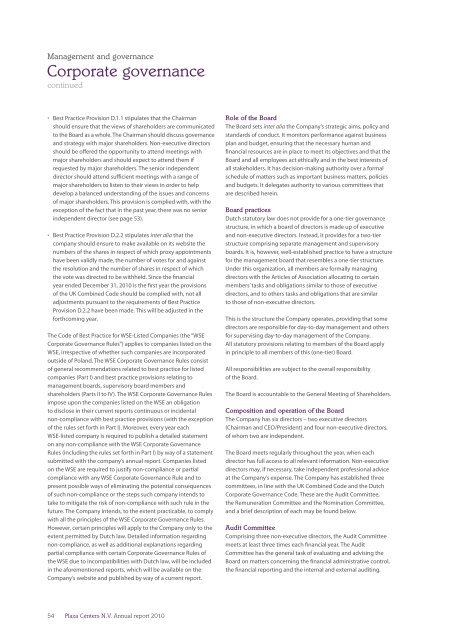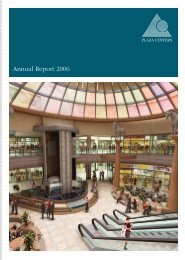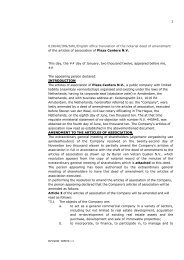Annual report 2010 - plazacenters
Annual report 2010 - plazacenters
Annual report 2010 - plazacenters
Create successful ePaper yourself
Turn your PDF publications into a flip-book with our unique Google optimized e-Paper software.
Management and governance<br />
Corporate governance<br />
continued<br />
• Best Practice Provision D.1.1 stipulates that the Chairman<br />
should ensure that the views of shareholders are communicated<br />
to the Board as a whole. The Chairman should discuss governance<br />
and strategy with major shareholders. Non-executive directors<br />
should be offered the opportunity to attend meetings with<br />
major shareholders and should expect to attend them if<br />
requested by major shareholders. The senior independent<br />
director should attend sufficient meetings with a range of<br />
major shareholders to listen to their views in order to help<br />
develop a balanced understanding of the issues and concerns<br />
of major shareholders. This provision is complied with, with the<br />
exception of the fact that in the past year, there was no senior<br />
independent director (see page 53).<br />
• Best Practice Provision D.2.2 stipulates inter alia that the<br />
company should ensure to make available on its website the<br />
numbers of the shares in respect of which proxy appointments<br />
have been validly made, the number of votes for and against<br />
the resolution and the number of shares in respect of which<br />
the vote was directed to be withheld. Since the financial<br />
year ended December 31, <strong>2010</strong> is the first year the provisions<br />
of the UK Combined Code should be complied with, not all<br />
adjustments pursuant to the requirements of Best Practice<br />
Provision D.2.2 have been made. This will be adjusted in the<br />
forthcoming year.<br />
The Code of Best Practice for WSE-Listed Companies (the “WSE<br />
Corporate Governance Rules”) applies to companies listed on the<br />
WSE, irrespective of whether such companies are incorporated<br />
outside of Poland. The WSE Corporate Governance Rules consist<br />
of general recommendations related to best practice for listed<br />
companies (Part I) and best practice provisions relating to<br />
management boards, supervisory board members and<br />
shareholders (Parts II to IV). The WSE Corporate Governance Rules<br />
impose upon the companies listed on the WSE an obligation<br />
to disclose in their current <strong>report</strong>s continuous or incidental<br />
non-compliance with best practice provisions (with the exception<br />
of the rules set forth in Part I). Moreover, every year each<br />
WSE-listed company is required to publish a detailed statement<br />
on any non-compliance with the WSE Corporate Governance<br />
Rules (including the rules set forth in Part I) by way of a statement<br />
submitted with the company’s annual <strong>report</strong>. Companies listed<br />
on the WSE are required to justify non-compliance or partial<br />
compliance with any WSE Corporate Governance Rule and to<br />
present possible ways of eliminating the potential consequences<br />
of such non-compliance or the steps such company intends to<br />
take to mitigate the risk of non-compliance with such rule in the<br />
future. The Company intends, to the extent practicable, to comply<br />
with all the principles of the WSE Corporate Governance Rules.<br />
However, certain principles will apply to the Company only to the<br />
extent permitted by Dutch law. Detailed information regarding<br />
non-compliance, as well as additional explanations regarding<br />
partial compliance with certain Corporate Governance Rules of<br />
the WSE due to incompatibilities with Dutch law, will be included<br />
in the aforementioned <strong>report</strong>s, which will be available on the<br />
Company’s website and published by way of a current <strong>report</strong>.<br />
Role of the Board<br />
The Board sets inter alia the Company’s strategic aims, policy and<br />
standards of conduct. It monitors performance against business<br />
plan and budget, ensuring that the necessary human and<br />
financial resources are in place to meet its objectives and that the<br />
Board and all employees act ethically and in the best interests of<br />
all stakeholders. It has decision-making authority over a formal<br />
schedule of matters such as important business matters, policies<br />
and budgets. It delegates authority to various committees that<br />
are described herein.<br />
Board practices<br />
Dutch statutory law does not provide for a one-tier governance<br />
structure, in which a board of directors is made up of executive<br />
and non-executive directors. Instead, it provides for a two-tier<br />
structure comprising separate management and supervisory<br />
boards. It is, however, well-established practice to have a structure<br />
for the management board that resembles a one-tier structure.<br />
Under this organization, all members are formally managing<br />
directors with the Articles of Association allocating to certain<br />
members’ tasks and obligations similar to those of executive<br />
directors, and to others tasks and obligations that are similar<br />
to those of non-executive directors.<br />
This is the structure the Company operates, providing that some<br />
directors are responsible for day-to-day management and others<br />
for supervising day-to-day management of the Company.<br />
All statutory provisions relating to members of the Board apply<br />
in principle to all members of this (one-tier) Board.<br />
All responsibilities are subject to the overall responsibility<br />
of the Board.<br />
The Board is accountable to the General Meeting of Shareholders.<br />
Composition and operation of the Board<br />
The Company has six directors – two executive directors<br />
(Chairman and CEO/President) and four non-executive directors,<br />
of whom two are independent.<br />
The Board meets regularly throughout the year, when each<br />
director has full access to all relevant information. Non-executive<br />
directors may, if necessary, take independent professional advice<br />
at the Company’s expense. The Company has established three<br />
committees, in line with the UK Combined Code and the Dutch<br />
Corporate Governance Code. These are the Audit Committee,<br />
the Remuneration Committee and the Nomination Committee,<br />
and a brief description of each may be found below.<br />
Audit Committee<br />
Comprising three non-executive directors, the Audit Committee<br />
meets at least three times each financial year. The Audit<br />
Committee has the general task of evaluating and advising the<br />
Board on matters concerning the financial administrative control,<br />
the financial <strong>report</strong>ing and the internal and external auditing.<br />
54<br />
Plaza Centers N.V. <strong>Annual</strong> <strong>report</strong> <strong>2010</strong>








